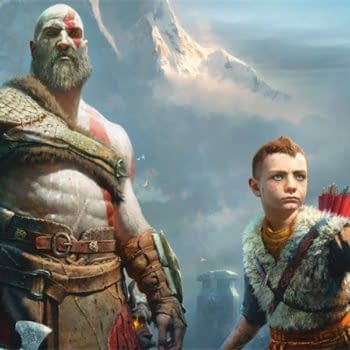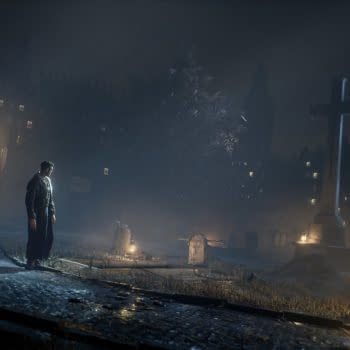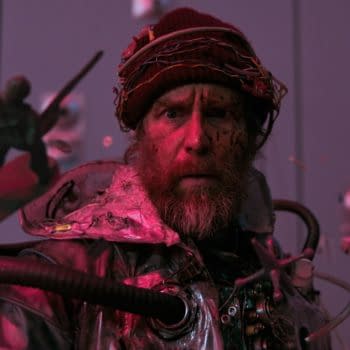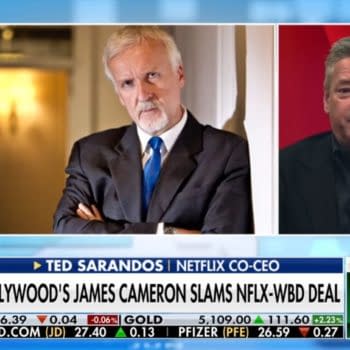Posted in: Movies | Tagged: entertainment, film, ip man, ip man 3, look it moves
Ip Man 3 And The Kung Fu Hero Myth – Look! It Moves! By Adisakdi Tantimedh
Oh look, it's Ip Man 3, and this time he fights Mike Tyson!
Now, I'm sure many of you don't think Bruce Lee's kung fu teacher really fought Mike Tyson. Mike Tyson would have been in kindergarten when Ip Man passed away in 1972, but why let that get in the way of a good Kung Fu movie? Nobody watches kung fu movies for plot or historical accuracy. No, in the end, the Ip Man Trilogy is really a combination of two things: turning Ip Man into a myth and Donnie Yen into a movie star at last.
The Ip Man Trilogy continue a Hong Kong movie tradition of creating a myth of the real-life kung fu master as symbol of virtual and righteousness, even if complicated and inconvenient facts had to be left out in the process. This trend actually goes all the way back to the 1950s with the Wong Fei Hong movies, a studio-bound series that lasted over 70 movies, based on the real-life martial artist and doctor of the same name, here dealing with thugs and gangsters while teaching moral lessons to his disciples. The series was rebooted by Tsui Hark into the blockbuster Once Upon a Time in China series starring Jet Li in the 1990s. Jet Li also played real-life martial artist Hou Yuan Jia in his last kung fu movie Fearless, announcing his retirement from the genre after that, just as Donnie Yen has now declared Ip Man 3 would be his last Kung Fu movie.
Ip Man may be the last virtuous martial artist of the movies for the foreseeable future. As the man who brought the Wing Chun form to international attention because he taught Bruce Lee, he was ripe for a Hong Kong kung fu movie that extolled Chinese patriotism for Mainland China once it opened up its movie market to overseas fare. The first two movies were very much about reasserting Chinese virtue and strength against foreign invaders, especially the Japanese.
The third movie has a sense of finality with an older Donnie Yen and shows Ip Man coping with his wife's illness on top of coping with rivals and gangsters terrorising the streets of 1960 Hong, including Mike Tyson as a hood who wants to buy the land on which Ip Man's son's school stands. Ip Man also accepts a young Bruce Lee as his student, setting history in motion. Of course, the movie plays fast and loose with the facts, as did every movie about Ip Man. Aside from this trilogy, there was Herman Yau's Ip Man: the Legend is Born, an unrelated prequel about his younger years, and Wong Kar Wai's The Grandmaster, which took an elliptical, arthouse approach to its depiction of Ip Man's life from his home town of Foshan to his eventual immigration to Hong Kong to open a martial arts school after World War II to paint an elegiac picture of the lost world of martial arts and pre-war Chinese society. None of the movies actually showed certain facts about Ip Man's life, that he was a policeman in China who supported Chiang Kai Shek and had to leave for Hong Kong after the war when the Communists took over, and that he smoked opium. The Grandmaster touched on his leaving his first wife behind in China when he left for Hong Kong and the loss of his daughters during the war. If anything, Herman Yau's Ip Man: The Final Fight, with its interest in labour relations and the political unrest in 1950s Hong Kong, hued closest to the facts of Ip Man's life in Hong Kong, from his financials struggles that led to establishing his school to make a living, to the death of his first wife in China, to his relationship with the woman who became his second wife, whom his students disapproved of for being from a lower class background.
The shadow that hangs over the Ip Man story and all the movies is of course Bruce Lee. The makers of Ip Man 3 had originally planned to feature a CGI Bruce Lee as a gimmick and homage to close the narrative circle but were threatened with a lawsuit by Bruce Lee's estate, who control the use of his likeness and have so far prohibited the making of any comprehensive biopic. The producers compromised by casting a lookalike actor that the estate approved instead. In real life, Bruce Lee's relationship with Ip Man and his school was a bit more complex, with the young Lee finding a father figure in his instructor when his relationship with his own father was strained, but jealousy and resentment from the other students resulted in his leaving the school and going to America to work in Hollywood (and also for safety since his family were concerned that the fights he got into might get him killed) before returning to Hong Kong in frustration to star in the movies that finally made him a star. I always found it interesting that the fans of Bruce Lee tend to ignore the fact that he was a child actor who had appeared in Hong Kong movies (many of them lost) before he even started learning Wing Chun at sixteen, so show business and performance were always intricately tied to his work as a martial artist. Various details from Bruce Lee's life have been woven into the plot of Ip Man 3, but at the end of the day, this and the other movies serve as a series of funhouse mirrors where the real facts of Ip Man's life were alluded to and touched upon but never truly depicted because of the need by filmmakers to treat the Kung Fu genre as a mythmaking genre.
Donnie Yen had first emerged in the 1980s but never really got to play a lead role, mostly landing second-string roles and villains despite being as skilled as Jet Li and the two of them coming out of the same martial arts school. His journey towards official leading man status had been a long time coming. He finally became a leading man with Sha Po Lung in 2005 playing a cop prone to excessive force and the first two Ip Man movies cemented his stardom. Since the two Ip Man movies, he has played the lead in several movies and started to take roles to show a bit more range than the usual stoicism and also adapting his fighting styles to accommodate different schools of thought depending on the plots. As martial artists get older, their bodies can't bounce back from the strain and injuries they might have shrugged off earlier in their careers, and he's probably going to move into straight dramatic acting, directing and fight choreography, but his career is now forever tied to the legacy of Ip Man and that trilogy. Ip Man 3 has become a kind of post-modern metatext of the Kung Fu genre.
Ip Man 3 is now playing in US cinemas. Many of Donnie Yen's recent movies can be seen on Netflix.
A Yen for Kung Fu at lookitmoves@gmail.com
Follow the official LOOK! IT MOVES! twitter feed at http://twitter.com/lookitmoves for thoughts and snark on media and pop culture, stuff for future columns and stuff I may never spend a whole column writing about.
Look! It Moves! © Adisakdi Tantimedh














